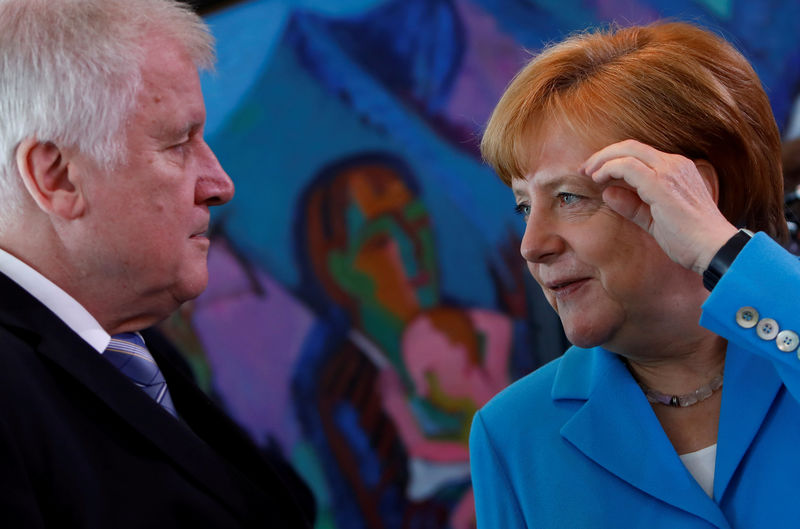By Madeline Chambers
BERLIN (Reuters) - Migrant policy requires a European solution, German Chancellor Angela Merkel insisted on Saturday, ceding no ground in a showdown with her Bavarian allies that threatens her three-month-old coalition government.
The row is over Merkel's rejection of plans by Interior Minister Horst Seehofer, from Bavaria, for Germany unilaterally to send back migrants who have registered in other European Union countries.
Such a reversal of her 2015 open-door migrant policy would be a huge blow to the authority of Merkel, in power for more than 12 years, and undermine the Schengen open-border system at a time when EU tensions over migration are running high.
In her weekly podcast, three days before talks between Merkel and French President Emmanuel Macron, the chancellor hammered home her stance:
"This is a European challenge that also needs a European solution. And I view this issue as decisive for keeping Europe together," she said.
Merkel wants two weeks to try to strike bilateral deals with partners, such as Italy and Greece, on migrants - possibly similar to one struck between the EU and Turkey in 2016 - and to make progress at a June 28-29 EU summit on an EU-wide policy.
Seehofer's Christian Social Union (CSU), facing a tough state vote in October, doesn't want to wait. Members say the minister will defy Merkel on Monday if no compromise has been reached by then, and go ahead with the plans alone.
Such an affront to Merkel could force her to fire Seehofer, and there is even talk of the end of the 70-year conservative parliamentary alliance between Bavaria and Merkel's Christian Democrats (CDU).
Without the CSU, the CDU and Social Democrats (SPD) - the third party in her "grand coalition" - would lack a majority.
CSU General Secretary Markus Blume told the Straubinger Tagblatt newspaper the party stood behind Seehofer. "We are at a decisive watershed in the history of this republic," he said.
Some pro-business Free Democrats (FDP) are already speculating about the possibility of a possible alliance with Merkel and the environmentalist Greens.
After the September election, Merkel had tried to forge a nationally-untested coalition with the two smaller parties, who have fundamentally differing positions, and the CSU, but failed.
'POLITICAL EARTHQUAKE'
Merkel, who has fought criticism from some CDU members who prefer the CSU's tougher line, seems to have won over a majority of her lawmakers as it dawns on them how high the stakes are.
"Dissolving the cooperation agreement would bring the end of the government coalition. That would cause a political earthquake," Ingo Senftleben, head of the CDU in the state of Brandenburg, told RND media group.
CDU budget expert Eckhardt Rehberg said the row could trigger new elections and several CDU figures called for a compromise to avoid such an outcome. It was unclear if behind-the-scenes exchanges were taking place over the weekend.
Merkel's refugee policy, which has led to more than 1.6 million migrants arriving in Germany in the last three years, is widely blamed for a surge in support for the far-right Alternative for Germany (AfD), which entered parliament after a September election and is the main opposition party.

Merkel also said Germany and France would try to give new momentum to EU cooperation on foreign, defense and security policy and on further developing the economic and currency union. Germany and France have promised to agree on joint proposals for euro zone reform before this month's EU summit.